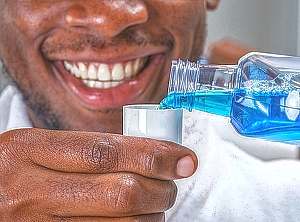An under-explored strategy to better control transmission of SARS-CoV-2, especially in children to young to be vaccinated, may involve the use of a dilute oral antiseptic gargle or oral rinse, reports MedPage Today.
Although the relatively small-scale of gargle-based clinical trials leaves them vulnerable to the criticism of being poorly performed and underpowered, the emerging evidence is supportive that use of dilute oral antiseptics may be a safe way to reduce viral transmission, the authors, Jesse Pelletier and Terrence P O'Brien, note.
The idea is simple. If a child is asymptomatically infected and shedding virus, a before- and after-school oral treatment can potentially diminish the quantity or quality of active virus entering infectious droplets/aerosols making them less infectious. On the other hand, if a child is healthy but exposed to the virus, the treatment might provide prophylaxis against or at least mitigate infection.
These ideas are not new, but the science of oral antiseptics and their effects on viral transmission dynamics during the last year has taken a big leap forward. Early in this millennium a group of Japanese doctors termed “The Great Cold Investigators” began to examine the influence of gargling on upper respiratory tract infections and influenza-like illnesses. What they and other investigators found is significant.
A series of randomised controlled trials support the notion that gargling with interventions like water, green tea, and dilute povidone-iodine (PVI) may indeed reduce the incidence of these illnesses. Interestingly, the act of gargling water may reduce oropharyngeal proteases, which are critical to viral infection, and the chlorine present in tap water may be of sufficient concentration to inactivate viruses.
In one landmark study in Japan, children from Yamagata City who routinely gargle with dilute PVI for three months during the winter reported less absenteeism secondary to the common cold and influenza.
Numerous in-vitro reports have highlighted the efficacy of gargle active pharmaceutical ingredients like PVI, chlorhexidine, essential oils, alcohols, and hydrogen peroxide against SARS-CoV-2. The difference this time is that these studies carried over into in-vivo, smaller scale clinical trials.
Of all the studied active pharmaceutical ingredients, perhaps the best data has been generated with dilute PVI. This is a broad-spectrum microbiocide with years of data supporting its ability to decontaminate human tissues and kill contagions capable of pandemic spread. It is safe, makes the World Health Organization list of essential medicines, and has not been implicated in antimicrobial resistance. Importantly, its use is not known to alter healthy, supportive populations of the microbiome.
Independent clinical trials in the setting of active COVID-19 have shown that administration of dilute PVI decreases viral RNA quantification, decreases infectious viral titers, decreases active virus in whole mouth fluid and respiratory droplets, speeds viral clearance, and protects against infection.
While large-scale randomised controlled trials are certainly lacking, there is still much to be gleaned from other types and levels of evidence, especially when backed by millennia of favourable experience and implemented for clinical necessity during a pandemic.
Full Medpage article – Can Gargling Protect School Kids From COVID? (Open access)
See more from MedicalBrief archives:
Some OTC mouthwashes neutralise human coronaviruses — Laboratory study
CDC investigates 'relatively few' reports of myocarditis from Pfizer vaccination
COVID-19 in children: No room for complacency
High COVID-19 mortality rate in children and adolescents — Brazil's syndemic
Schools guidance to reflect new evidence on distancing in classrooms — CDC
China says early data shows Sinovac vaccine is safe in children

